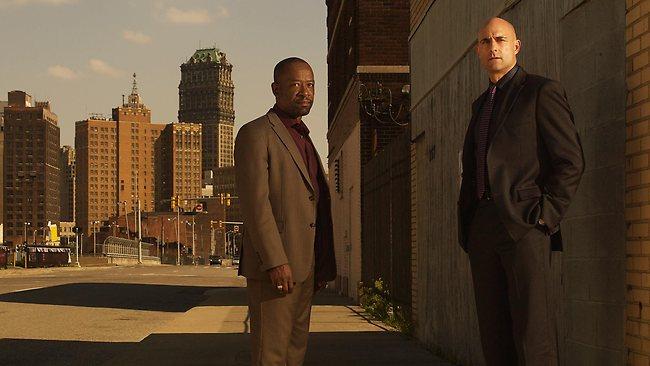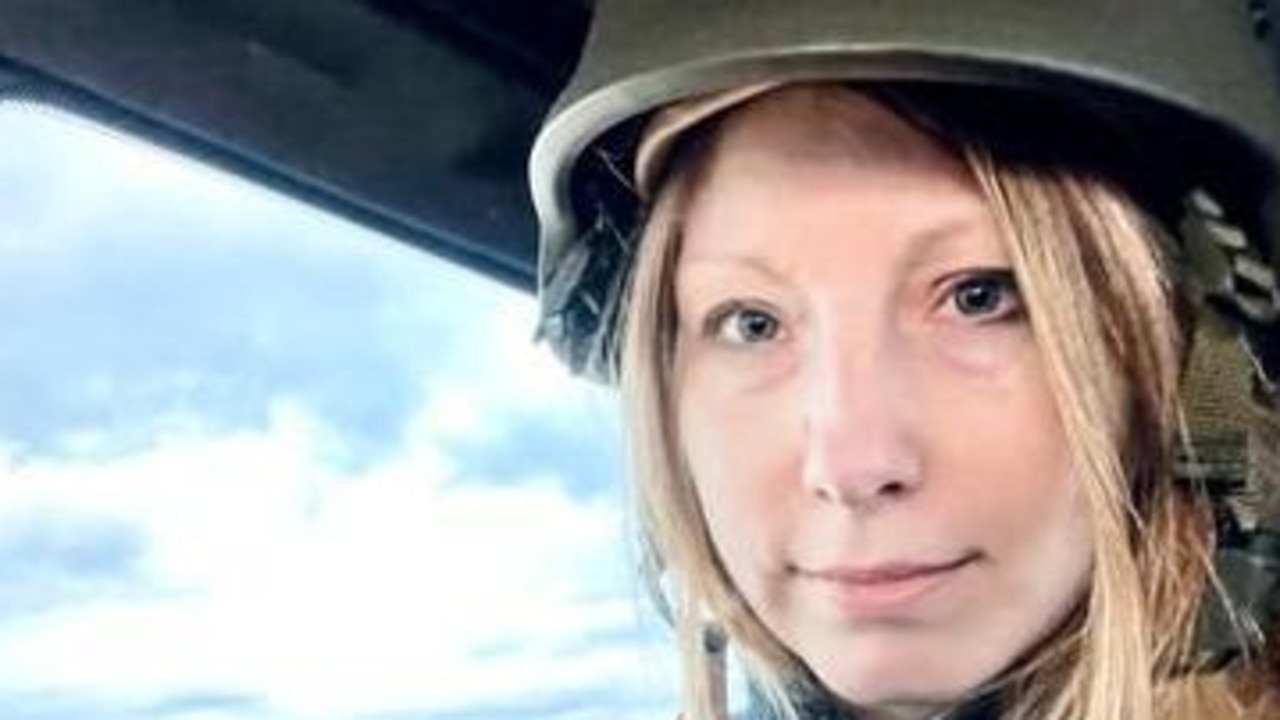Running blind in new noir series Low Winter Sun
RIGHT and wrong blur in a new police series set in a crumbling Detroit.

INCREASINGLY, TV crime is catching on to what the Wyoming writer CJ Box - master of what's become known as "wilderness noir" - calls the dirty little secret about the very best contemporary crime fiction. Often it doesn't matter much who did it and why, but where the story is set; and that solving the crime is simply a vehicle to travel through the fiction's territory.
"Reading the best crime novels about specific locations by authors who live there and own their home turf is like visiting with the ultimate know-it-all guide who moonlights as a voyeur," Box, who sets his thrillers featuring game warden Joe Pickett in the Rocky Mountains, wrote recently. "I want you to feel like you're there - struggling, suffering, and plotting righteous revenge with the characters while the snow falls and the mountains loom over your shoulder and your life and hopes plunge into a death spiral."
Every TV mystery, too, has a geography that, depending on the skill of the producers, provides the stage for the action and often plays a critical role in the plot or solution. Think of The Wire's Baltimore, Rebus's Edinburgh, The Bill's London, Midsomer Murders' Buckinghamshire and Law & Order's Gotham City-like New York. And, of course, there's New Mexico's Albuquerque for Breaking Bad with its deserts and floating clouds. (The show has spawned a new industry in the state of New Mexico - Breaking Bad tourism. The saga about a high-school teacher who becomes a drug dealer to fund his cancer treatment is shot entirely in Albuquerque and diehard fans flock to the city to check out the locations.)
Californian crime writer Ross Macdonald said the fictional detective in the pursuit of his investigations discovered a certain darkness in himself that could "only be explored in terms of badly lighted streets and unknown buildings, alien rooms and the strangers who live in them".
Macdonald could be describing the tormented cops who feature at the centre of the substantial new noir series Low Winter Sun, a Crime and Punishment-inspired story set in the recently bankrupted city of Detroit, a series that just may be the new Breaking Bad.
The show comes from US network AMC, the only cable network ever to win the Emmy award for outstanding drama series four years in a row, and that boasts the most watched drama series in cable history with The Walking Dead. AMC's original series, apart from the aforementioned Breaking Bad, also include Mad Men, The Killing (the US version of the Scandinavian drama) and Hell on Wheels.
Based on the award-winning 2006 British miniseries of the same name, Low Winter Sun was created by Chris Mundy (Criminal Minds, Cold Case), the former Rolling Stone editor, who also serves as writer and executive producer. It's an absolute cracker of a show, Mundy a natural noir poet, his characters seeking release and deliverance, his plot obsessed, like so much crime fiction, with the impact of the past on the present.
Low Winter Sun begins with an act of retribution - the murder of a dirty cop by two fellow Detroit detectives, the stoic, straightforward Frank Agnew (Mark Strong) and Joe Geddes (Lennie James), smart but slippery, a veteran who seemingly has other agendas in mind rather than simply bloody payback.
Seemingly the perfect crime, in reality the murder activates forces that will alter the detectives' lives and pull them into the heart of the Detroit underworld.
The title has a lovely noirish feel, referencing the way in winter the days are short and the sun is low in the sky. "The way I chose to believe it is there is a certain time in the northern hemisphere in winter where the sun is so low it is blinding and you can't find your way forward," Mundy says.
Each week, Agnew and Geddes - already on a quest that will become increasingly ambiguous and exasperating - are forced to seek not only the factual solutions to the mysteries they confront but for some moral stance towards the events in which they have become enmeshed. Agnew is used to taking on his own burdens and those of others but his rash act has put him possibly at the mercy of Geddes, who conceivably has murdered in order to mask his own misdeeds.
This is a show about the murky and problematic concern of guilt, the blurred lines between good and bad. Unlike the conventional detective story, there is no outflanking here of the irrational and the anxious as the investigator makes sense of a crime by finding it a problem susceptible to a rational solution. There are no easy reassurances in Low Winter Sun; it's unsettling and leaves you uncomfortably uncertain of what you feel about its central characters, much as you do with Breaking Bad.
It's one of those testing pieces of crime fiction where the central and defining feature is that guilt and innocence are never clear. As Mundy says, it's not a whodunit: we know who did it. "It's about people who keep making decisions based on a bunch of lousy options."
We usually approach this kind of crime story with a not altogether unpleasurable feeling of having our values questioned. The murderers in this kind of crime narrative, as distinct from the detective kind, may never be caught; if they are they may well be the characters with whom we most identify.
Geddes explains Detroit's brand of morality to Agnew early on. "Folks talk about morality like it's black and white, or maybe they think they're smart and at a cocktail party acting all pretentious and they say it's grey," he says. "But do you know what it really is: it's a damn strobe light flashing back and forth, like all the time, so all we can try and do is figure it out, see it right enough to stop from getting our heads bashed in."
There is a lot of plot in the pilot episode and it's laid out sparely and stylishly to a sound track of hip-hop, garage rock, old soul tunes, and 1970s metal. Mundy gets his characters on their feet without exposition suffocating them at the start.
Apart from stable mate Breaking Bad, few recent dramas have managed to distil with such pessimism the loneliness, nihilism and incipient violence that define the contemporary American urban landscape.
Directed with great panache by Ernest Dickerson, the series is superbly photographed by Patrick Murguia with long master takes, tight close-ups often occurring naturally in the framing rather than by cuts. It's unsettling and claustrophobic, apparently influenced by the elegiac style of Mexican auteur Alejandro Gonzalez Inarritu (21 Grams, Biutiful).
Low Winter Sun may just be the most cinematic of all TV series so far, Murguia finding in Detroit, a terrible moody beauty. Mundy gives us a drama that is determined to absorb the dystopian atmosphere of the former Motor Town, where civic affliction and potential bankruptcy are givens, but economic devastation hasn't yet eroded pride.
It was the frontier city of the American dream; not just the automobile, but pretty much everything we associate with 20th-century Western civilisation came from there. Mass production, assembly lines, stop lights, freeways, shopping malls, suburbs and an emerging middle-class workforce: all these things were developed in Detroit.
Now the city is like a setting for a Blade Runner sequel: streets of empty houses, rubbish, burning cars, jarringly deserted ghost freeways and downtown Detroit a rusty shell. But it is also in a very interesting state, simultaneously decomposing and evolving into a new city. Like Mundy's characters, it's been down on its knees, fear and apprehension around every corner, but it's trying to find a way to regenerate itself.
DATING - as Peter Helliar's new comedy series for the ABC, It's a Date, so drolly dramatises - is a pagan, lunar summons that doesn't just afflict the young. Even after failed marriages, children, mortgages, haemorrhoids, migraines and betrayal, it's still a frightening ritual if you're single. When you're doing it, the bone-grinding dread is lifted only occasionally by those strange moments of feeling crazily liberated, but when it comes that wound from Cupid's arrow can be a cure for the crushing weight of being on your own.
Starting this week, Helliar's eight-part show, a narrative comedy with some lovely sketches built into its structure, explores the often horrifying tensions, expectations and complications of going out with someone; the way - I speak from experience, you understand - you encounter many walking wounded and the kinds of reactions usually associated with post-traumatic stress: deep depression, denial, severe anxiety, sexual dysfunction and a crippling reclusiveness.
You never realised a conversation could be so difficult, English a second language. It's as if you're talking on crutches: every sentence needs physiotherapy.
Each episode in Helliar's show thematically links two self-contained dates as they bravely head towards the fulfilment of desire or, more usually, emotional disaster. There's a different cast of curious, sometimes desperate, and vulnerable characters in each episode who cope with a different set of situations and encounter different questions. How important is honesty and why do we lie so much? Is a sense of humour really important? What about compatibility, first impressions, age difference, dating on the rebound, and do opposites attract? Then there's that underlying and perplexing question at the centre of all dates - how many does it take for whatever happens between you to be called a "relationship"?
The estimable Laura Waters, who in the past has corralled both the seemingly unmanageable John Safran and the equally mischievous and demanding Chris Lilley, is executive producer, the series produced by her innovative company Princess Pictures. The idea for the show is startlingly clever and, as you always do in encountering this kind of lateralness in the craft of making TV shows, you keep thinking why someone hasn't done it before. Helliar and Jonathan Brough direct the episodes and keep them simple and free of flashiness and any look-at-me-aren't-I-clever camerawork. The stories are told simply, the unfussy framing leaving lots of space in which they actors can play with some deftly written characters.
The first episode, while a touch uneven in places, rather like a typical dating encounter really, looks at the prickly dilemma of when you should abandon a date that's going nowhere - how you do the old bail-out to save some semblance of self-respect?
Frisky Em (Lisa McCune) is not only determined to crowd a reluctant Greg (creator Helliar) into an encounter, but will go to extraordinary lengths to ensure it works. It becomes apparent there's more to this date than meets the eye, especially when a burst of spontaneity leads the couple to a strip club.
And, in parallel, there's the story of Patrick (Dave Lawson) and his attempt to manipulate his girlfriend Jasmine (Poh Ling Yeow) into a date at a mini golf course so he can propose. It's a quest complicated by fraught encounters with an ex-girlfriend and a belligerent car window washer, and an episode involving an unfortunately recently deceased rabbit.
In the case of both stories, writers Helliar and Phil Lloyd (Review with Myles Barlow) make the most of the way male humour is simply not equipped to deal with an event that reduces human nature to biology, psychiatry and gender politics and their dating partners to weeping borderline-paranoid personalities within, on average, three weeks.
McCune is the stand-out, with her sexually precocious character Em more physical than we usually see the actress, whose flashing smile would ripen a bowl of bananas.
Dawson also has a compelling comic physicality about him, and Yeow, better known as a TV chef, while struggling sometimes with the kind of actorliness this kind of comedy demands, is still alluring. In her cooking shows she's a TV natural, intelligent and naturally curious. Her captivating style is built on an infectious laugh that sometimes cackles, or embarrassingly just erupts, or sometimes is downright libidinous.
As an actor here, she manages to contain her sexiness in a neat performance with a subtle sourish edge, at least until that that smile starts to emerge.
Helliar is a surprise, too. Once Rove McManus's second banana, he's often been the buffoon in sporting shows through the years, where he seemed to suffer from that "laugh clown laugh" Pagliacci syndrome. He always appeared to be struggling in front of the camera, distress lurking behind his eyes.
Now, he has become a convincingly good actor, his humour emerging more maturely from his awkwardness and his flustered, stumbling speech. There's still that curious vulnerability about him, a quality of perpetual isolation and the sense the whole world conspires against his dignity. But he's in control now, on the way to becoming a seriously big-time comic talent, as actor, writer and director.
Low Winter Sun starts Tuesday, August 27, 8.30pm, FX.
It's a Date, Thursday, 9pm, ABC1.



